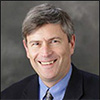Download PDF

By Russell N. Van Gelder, MD, PhD, 2015 Academy President
One of my favorite events of the academic year is the evening in the fall when several of our department’s faculty meet with the medical students interested in pursuing a career in ophthalmology. Between five and 10 students usually show up (although a few are probably only there for the free pizza). We spend the evening sharing with the students what it’s like to be an ophthalmologist.
The short version: It’s great! As ophthalmologists, we have the unique privilege of providing complete medical and surgical care for the eyes and attendant tissues. We can help the majority of patients we care for. We get to master a range of effective and fascinating surgeries; we treat our patients for chronic disease; we have an outstanding literature permitting us to embrace evidence-based medicine. We take care of the very youngest preemies to the oldest people on the planet. I cite the Academy’s survey results showing the very high satisfaction that our members have in ophthalmology— among the highest in all of medicine.
We have a vibrant field, with new basic science knowledge, new diagnostic tools, new treatments, new surgical instrumentation, and new surgeries being introduced annually. When I was a resident, we had no OCT, no prostanoids, no anti-VEGF agents, no small-gauge vitrectomy devices, and no femtosecond lasers, all of which we now use every day in our practice.
A student asks the question: “What do you see changing in the field in the next 20 years?”
What to tell the student? That health care reform is threatening our ability to care for our patients, forcing us to make decisions on behalf of society that may not benefit the individual patient? That the ability to run a solo or small group practice—the historical home of most ophthalmologists—is threatened by declining reimbursement and hospital-based health care systems? That the efficiency and effectiveness in our surgeries will continue to be turned against us, such that we are paid for our time rather than our value to society? That optometrists, who have never set foot in an operating room, who have not been through the gantlet of medical school, internship, and residency, are fighting a national political war to earn the privilege of being surgeons?
I tell the student that being an ophthalmologist will continue to be among the most fulfilling careers in all of medicine. That our science and technology will continue to flourish and that during her practice life we will likely see improved treatments for nearly every eye disease. Yes, we do face real and imposing challenges to our specialty from health care reform and health care economics. We must expend great resources, including our own time and money, to ensure that our patients are protected from politicians ignorant of the training necessary to be a surgeon. But to have confidence that ophthalmology, as represented by our Academy—31,000 members strong—will rise to each of these challenges, as it has repeatedly during its 118-year history.
I was that medical student 20-some years ago, and I cannot imagine that I could have chosen a more fulfilling career. It is a singular honor to serve in 2015 as President of the Academy. I pledge to do my utmost to serve our members and protect and improve our profession. I want to be sure, 20 years from now, I can still tell our students how wonderful it is to be an ophthalmologist.